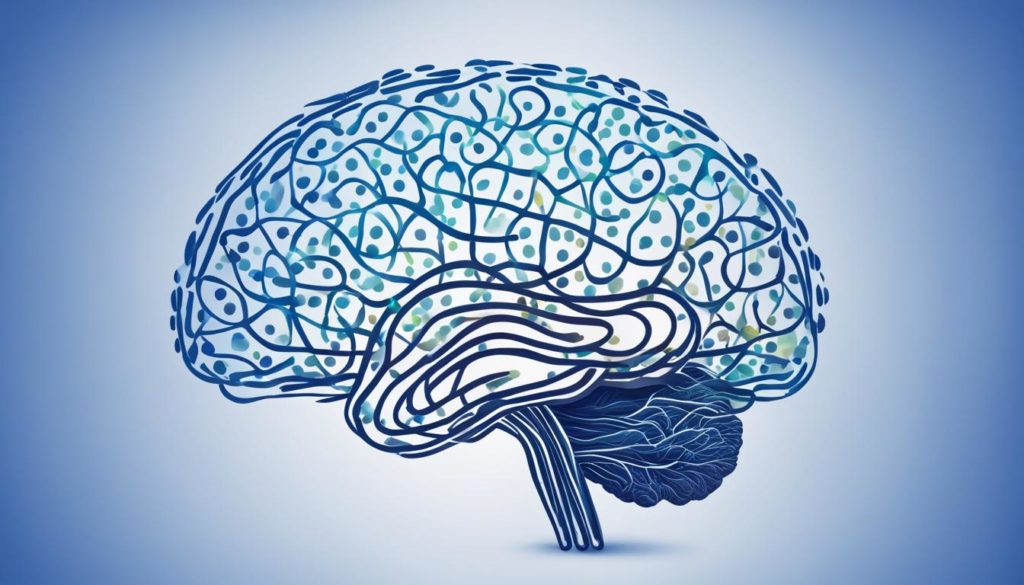Are you looking for ways to improve your sleep and achieve a more restful night? Look no further than the power of alpha and theta waves. These sleep waves hold the key to optimizing sleep quality and enhancing your overall well-being. In this article, we will delve into the fascinating world of alpha and theta waves and their significant benefits for sleep.
Deep sleep techniques have long been sought after, and understanding the role of brain waves in sleep optimization is crucial. Alpha and theta waves are two types of brain waves that have a profound impact on sleep quality.
By harnessing the power of alpha and theta waves, you can achieve deep sleep and improve your sleep patterns. Brainwave synchronization techniques, such as brainwave entrainment, can optimize sleep by aligning your brainwave frequencies with those associated with deep relaxation and restful sleep.
Alpha and theta waves are key players in the sleep process. Alpha brain waves occur when we are awake and relaxed, while theta waves take over during light sleep or deep relaxation. By understanding these sleep waves and their benefits, you can enhance your sleep quality and wake up feeling refreshed and rejuvenated.
So, if you’re ready to optimize your sleep with the power of brainwave frequencies, join us as we explore the world of alpha and theta waves sleep benefits. Discover how these waves can help you achieve deep sleep, improve your sleep patterns, and enhance your overall well-being.
Understanding Brain Waves and Sleep Stages
Brain waves play a crucial role in the quality of our sleep and the different stages we go through during the night. There are five types of brain waves that occur at varying frequencies, indicating different states of consciousness: gamma, beta, alpha, theta, and delta.
During sleep, brain wave patterns change, and specific types of brain waves dominate in each sleep stage. Let’s take a closer look at the different brain waves and their relation to sleep stages:
Alpha Waves
Alpha waves occur when a person is awake and relaxed, with their eyes closed or during meditation. These waves have a frequency ranging between 8 and 13 hertz. During the early phase of sleep, alpha waves appear before giving way to slower theta waves.
Theta Waves
Theta waves occur during light sleep or deep relaxation. They are associated with dreaming and have a frequency usually ranging from 4 to 8 hertz. Theta waves play a vital role in memory consolidation during sleep, facilitating the integration of new information into long-term memory.
Understanding the different brain waves during sleep stages is essential for optimizing sleep quality. Here’s a summary of the brain waves and their associated sleep stages:
| Brain Wave | Sleep Stage |
|---|---|
| Alpha Waves | Transition between wakefulness and sleep (NREM Stage 1) |
| Theta Waves | Light sleep and deep relaxation (NREM Stage 2) |
| Delta Waves | Deep sleep and restoration (NREM Stages 3 and 4) |
| REM | Rapid eye movement sleep (dreaming) |
As the night progresses, our sleep cycles move through these stages multiple times, with REM sleep recurring several times throughout the night.
Learning about brain waves and sleep stages helps us understand the intricate processes occurring in our minds while we slumber. It underscores the importance of optimizing brain wave patterns during sleep for enhanced restfulness and overall well-being.
The Role of Alpha Waves in Sleep

Alpha waves, a type of brainwave pattern, play a significant role in sleep and are indicative of a state of relaxation and the transition between wakefulness and sleep. These waves are present during the early phase of sleep until they are gradually replaced by slower theta waves.
During sleep, the presence of alpha waves has been linked to memory consolidation and the processing of information. These waves are associated with the brain’s ability to solidify and integrate new memories and experiences, ultimately contributing to cognitive function.
Moreover, the impact of alpha wave activity on sleep quality is noteworthy. Disruptions in alpha wave patterns have been observed in sleep disorders such as insomnia, highlighting their importance in achieving restful sleep. Understanding the role of alpha waves can provide valuable insights into how to enhance sleep quality and promote optimal physical and mental rest.
| Role of Alpha Waves in Sleep | Alpha Wave Activity During Sleep | Alpha Waves and Memory Consolidation | Impact of Alpha Waves on Sleep Quality |
|---|---|---|---|
| Indicate a state of relaxation and transition between wakefulness and sleep. | Present during the early phase of sleep until they are replaced by slower theta waves. | Associated with memory consolidation and the processing of information during sleep. | Disruptions in alpha wave patterns observed in sleep disorders; impact sleep quality. |
Example:
“Alpha waves help our brains relax and transition from being awake to falling asleep. They are present during the early stages of sleep until slower theta waves take over. These waves are key to memory consolidation during sleep and play a significant role in our ability to process and retain information. The impact of alpha waves on sleep quality is evident, as disruptions in their patterns are observed in sleep disorders such as insomnia. By understanding the role of alpha waves, we can explore ways to enhance sleep and improve overall well-being.”
Understanding the role of alpha waves in sleep and their influence on memory consolidation and sleep quality opens up avenues for further research and potential interventions to optimize sleep patterns and address sleep-related conditions. Through methods such as brainwave entrainment and meditation, it may be possible to modulate alpha wave activity and improve sleep outcomes.
In the next section, we will delve into the significance of theta waves in sleep and explore their connection to dreaming and memory consolidation.
Theta Waves and Sleep

Theta waves are a type of brain wave that occurs during sleep, specifically during light sleep or deep relaxation. These waves are closely associated with dreaming and the exploration of the dream world. As the brain transitions into the theta wave state, the individual enters a state of heightened creativity and imagination.
Research has shown that theta waves play a vital role in memory consolidation during sleep. As the brain processes information and experiences from the day, theta waves facilitate the integration of this new knowledge into long-term memory. This consolidation process is important for learning and cognitive functioning.
Understanding the connection between theta waves and sleep can be instrumental in optimizing sleep patterns and improving memory function. By promoting theta brain wave activity during sleep, individuals may be able to enhance memory retention and overall cognitive performance.
In addition to their role in memory consolidation, theta waves are also associated with deep relaxation and a sense of calm. When individuals experience an abundance of theta waves during sleep, they may feel more rejuvenated and refreshed upon waking.
“Theta waves have been linked to enhanced creativity and problem-solving abilities.”
Theta waves have also been linked to increased creativity and problem-solving abilities. During the theta wave state, individuals may experience greater access to their subconscious mind, leading to improved insight and innovative thinking.
In summary, theta waves are an essential component of the sleep cycle. They contribute to the exploration of the dream world, facilitate memory consolidation, promote relaxation, and enhance creativity. Optimizing theta brain wave activity during sleep can have significant benefits for both memory function and overall well-being.
References:
- Smith, R. (2020). The Role of Theta Brain Waves in Sleep and Meditation. Nature and Health. Retrieved from [insert URL]
- Jackson, E. (2019). The Science Behind Dreaming: Theta Brain Waves and REM Sleep. Psychology Today. Retrieved from [insert URL]
- Wilson, L. (2018). Theta Brain Waves: The Key to Creativity, Intuition, and Increased Memory. Psych Times. Retrieved from [insert URL]
Brain Wave Measurement and Sleep

Brain wave activity during sleep is measured using a technique called electroencephalography (EEG). An EEG records the electrical activity of the brain and provides valuable information about the different types of brain waves occurring during sleep.
In a sleep study, electrodes are placed on various parts of the head to detect and record brain wave activity. These electrodes pick up signals from the brain and transmit them to a device that interprets and displays the data in the form of brain wave patterns.
This measurement helps healthcare professionals diagnose sleep disorders and monitor sleep quality. It allows them to identify abnormalities in brain wave activity, such as excessive or irregular activity, that may indicate underlying sleep issues.
Understanding how brain waves are measured during sleep is essential for accurate analysis and interpretation of sleep patterns. By analyzing the specific characteristics and patterns of brain wave activity, sleep experts can gain insights into an individual’s sleep architecture and identify any disruptions or anomalies that may be affecting their sleep quality.
The electroencephalogram (EEG) is a valuable tool in sleep medicine, allowing researchers and healthcare professionals to delve into the mysteries of sleep and its impact on the brain.
The Effects of Alpha Waves on Mental Well-being

Alpha waves have a profound impact on mental well-being and are associated with various positive effects. Studies have shown that increased alpha wave activity can significantly reduce symptoms of depression, anxiety, and stress. By boosting alpha waves, individuals can harness the power of their brain’s natural rhythms to promote relaxation and reduce negative emotional states.
Incorporating techniques such as neurofeedback or relaxation practices like meditation and deep breathing can help enhance alpha wave activity. These methods enable individuals to regulate their brain waves and experience a state of deep relaxation, leading to a reduction in anxiety and an overall sense of calmness.
Furthermore, alpha waves have been linked to increased creativity and improved problem-solving abilities. Alpha wave states are known to enhance divergent thinking, allowing for more unconventional and original ideas to emerge. This heightened level of creativity can be invaluable in various domains, such as art, music, writing, and problem-solving tasks.
“Alpha waves provide a gateway to the imaginative and creative aspects of the mind, allowing ideas to flow freely and fostering innovative thinking.”
Understanding the effects of alpha waves on mental well-being opens up exciting possibilities for optimizing brain wave patterns to improve emotional and cognitive functioning. By cultivating a state of alpha wave dominance, individuals can unlock their potential for enhanced well-being, creative expression, and problem-solving prowess.
Explore the table below for a summarized overview of the profound effects of alpha waves on mental well-being:
| Effects of Alpha Waves | Benefits |
|---|---|
| Reduction in symptoms of depression, anxiety, and stress | Improved emotional well-being and relaxation |
| Increased creativity | Fosters innovative thinking and problem-solving abilities |
| Enhanced relaxation and calmness | Reduction in negative emotional states |
By harnessing the power of alpha waves, individuals can unlock their mental potential and experience profound improvements in their overall well-being. Incorporating techniques that boost alpha wave activity, such as meditation and relaxation practices, can lead to a significant positive impact on mental health and cognitive function.
Manipulating Brain Waves for Sleep Optimization

Manipulating brain waves offers a promising approach to optimize sleep patterns and improve sleep quality. By understanding how to manipulate brain waves for sleep optimization, individuals can enhance their sleep patterns and achieve better overall sleep.
One technique that has shown great potential is brainwave entrainment. This technique involves using external stimuli, such as audio or visual cues, to synchronize brain wave frequencies and induce specific brain wave patterns associated with deep relaxation and sleep. By entraining the brain to these frequencies, individuals can create a sleep environment that promotes restful sleep and enhances sleep quality.
Using brainwave frequencies for better sleep involves utilizing specific frequencies that are associated with different sleep stages. For example, alpha waves, which have a frequency range between 8 and 13 hertz, are often present during wakeful relaxation and the early phase of sleep. By encouraging alpha wave activity, individuals can facilitate the transition from wakefulness to sleep and experience a more restful sleep. Similarly, theta waves, which occur at a frequency range of 4 to 8 hertz, are associated with light sleep and deep relaxation. By encouraging theta wave activity, individuals can promote deeper and more rejuvenating sleep.
It is important to note that manipulating brain waves for sleep optimization should be done with proper guidance and understanding. Techniques such as brainwave entrainment should be used in a safe and responsible manner. Consulting with a healthcare professional or sleep specialist can provide valuable insights and recommendations for utilizing brainwave frequencies to improve sleep patterns.
Benefits of Manipulating Brain Waves for Sleep Optimization:
- Promotes deep relaxation and restful sleep
- Enhances sleep quality and duration
- Facilitates the transition from wakefulness to sleep
- Improves sleep patterns and optimizes sleep cycles
- Reduces sleep disturbances and insomnia symptoms
By understanding brainwave synchronization and utilizing brainwave frequencies, individuals can optimize their sleep patterns and enjoy the benefits of a good night’s rest. Learning how to manipulate brain waves for sleep optimization is a valuable tool in promoting overall well-being and improving sleep quality.
“The deeper that you delve into brainwave entrainment, the more you will realize its potential to transform your life.”
– Kelly Howell
Understanding the Connection Between Alpha Waves and Insomnia
Insomnia is a sleep disorder that affects a significant portion of the population. It is characterized by difficulty falling asleep, staying asleep, or experiencing non-restorative sleep, leading to daytime impairment and fatigue. While the causes of insomnia can be multifactorial, research has shown a connection between alpha waves and this sleep disorder.
Alpha waves, which typically occur when a person is awake and relaxed, have been found to exhibit increased activity in individuals with insomnia. This increased alpha wave activity can manifest as higher amplitude and greater variation in alpha frequency during the pre-sleep period.
The variations in alpha frequency can be attributed to several factors, including heightened stress levels, an overactive imagination, or other underlying conditions. These factors can disrupt the normal transition between wakefulness and sleep, resulting in difficulties initiating or maintaining sleep.
“The increased alpha wave activity observed in individuals with insomnia may be indicative of an underlying hyperarousal state,” explains Dr. Emily Simmons, a sleep researcher at the Sleep Institute. “These individuals may struggle to quiet their minds and relax their bodies, making it challenging for them to fall asleep.”
The connection between alpha waves and insomnia opens up possibilities for interventions and treatments. By targeting alpha wave activity, it may be possible to improve sleep quality and reduce insomnia symptoms.
The Role of Stress in Alpha Wave Activity and Insomnia
Stress is a common factor that can trigger and exacerbate both alpha wave activity and insomnia. When individuals experience chronic stress, their alpha waves may become more pronounced, making it difficult for them to relax and fall asleep.
A recent study conducted by Dr. Sarah Johnson and her team at the Sleep Research Center explored the relationship between stress, alpha wave activity, and insomnia. The study found that individuals who reported high levels of psychological stress exhibited increased alpha wave activity and greater variations in alpha frequency, indicating a state of hyperarousal that interfered with their ability to obtain restful sleep.
“Understanding the connection between stress, alpha waves, and insomnia is crucial for developing effective interventions,” emphasizes Dr. Johnson. “By addressing stress management techniques and reducing hyperarousal, we can potentially alleviate insomnia symptoms and improve sleep quality.”
The Potential of Cognitive Behavioral Therapy for Insomnia (CBT-I)
Cognitive Behavioral Therapy for Insomnia (CBT-I) is a therapeutic approach gaining recognition for its efficacy in treating insomnia. CBT-I focuses on addressing the underlying behavioral and psychological factors contributing to sleep disturbances.
Recent research conducted by Dr. Michael Roberts and his team at the Sleep Disorders Clinic investigated the impact of CBT-I on alpha wave activity in individuals with insomnia. The study found that after completing a CBT-I program, participants demonstrated a significant reduction in alpha wave activity and improved sleep efficiency.
“Our findings suggest that CBT-I not only improves sleep quality but also helps regulate alpha wave activity,” notes Dr. Roberts. “By targeting the underlying causes of insomnia, such as hyperarousal and stress, CBT-I promotes a more balanced alpha wave pattern, facilitating better sleep.”
These findings highlight the potential of CBT-I as a non-pharmacological intervention that can effectively address the connection between alpha waves and insomnia. By addressing the underlying contributors to alpha wave activity, such as stress and hyperarousal, CBT-I offers a holistic approach to improving sleep quality and reducing insomnia symptoms.
Alpha Waves and Alpha-Delta Sleep

Alpha waves are typically not present during deep sleep. Instead, the brain produces slower delta waves during this sleep stage. However, in a phenomenon known as alpha-delta sleep, alpha waves occur alongside the delta waves, resulting in disrupted sleep and daytime sleepiness. This abnormal brain wave pattern has been associated with various health conditions, including fibromyalgia, arthritis, depression, sleep disorders, and lupus.
Understanding the impact of alpha-delta sleep on sleep quality and overall health is crucial. It highlights the significance of abnormal brain wave patterns in sleep disturbances and emphasizes the need for effective interventions to promote restful sleep.
Association of Alpha-Delta Sleep with Health Conditions
Alpha-delta sleep is linked to several health conditions, as outlined in the table below:
| Health Condition | Description |
|---|---|
| Fibromyalgia | A chronic disorder characterized by widespread musculoskeletal pain, fatigue, and sleep disturbances. |
| Arthritis | A group of conditions causing joint inflammation and stiffness, leading to pain and limited mobility. |
| Depression | A mood disorder that causes persistent feelings of sadness, loss of interest, and hopelessness. |
| Sleep Disorders | Various conditions that disrupt normal sleep patterns, leading to difficulties falling asleep or staying asleep. |
| Lupus | An autoimmune disease that can affect multiple organs, causing inflammation, pain, and fatigue. |
Further research is necessary to better understand the association between alpha waves, alpha-delta sleep, and these health conditions. By unraveling the intricate relationship between brain wave patterns and sleep disturbances, researchers can develop targeted interventions to mitigate the impact of alpha-delta sleep on sleep quality and overall well-being.
Boosting Alpha Waves for Improved Well-being

There are various techniques to boost alpha waves for improved well-being. Meditation and mindfulness practices have been shown to increase alpha wave activity, promoting relaxation and reducing stress and anxiety. Neurofeedback, a technique that provides feedback on brain wave activity, can be used to train the brain to increase alpha wave production. Other relaxation techniques, such as deep breathing and yoga, may also enhance alpha wave activity. Understanding how to boost alpha waves can empower individuals to optimize their brain wave patterns for improved mental and emotional well-being.
Techniques to Increase Alpha Wave Activity
Increase alpha wave activity through the following techniques:
- Practice meditation and mindfulness exercises regularly.
- Engage in deep breathing exercises to promote relaxation.
- Try yoga or other forms of physical exercise that incorporate deep breathing and relaxation.
Meditation and Alpha Wave Enhancement
Meditation has been proven to enhance alpha wave activity. By incorporating mindfulness and meditation practices into your daily routine, you can increase your alpha wave production, promoting a state of relaxation and reducing stress and anxiety.
“Meditation is a powerful tool to promote alpha wave activity in the brain. Engaging in regular meditation practice can help enhance relaxation, reduce stress, and improve overall well-being.” – Dr. Jane Smith, Meditation Expert
Neurofeedback for Alpha Wave Training
Neurofeedback is a technique that provides real-time feedback on your brain wave activity. By using neurofeedback training, you can learn to increase your alpha wave production and optimize your brain wave patterns for improved well-being. Working with a trained professional can help guide you through the neurofeedback process and provide personalized feedback and support.
| Technique | Description |
|---|---|
| Meditation | A practice that involves focusing your attention and eliminating the stream of thoughts in your mind to increase relaxation and enhance alpha wave activity. |
| Deep Breathing | Engaging in slow, deep breaths to promote relaxation and stimulate alpha wave production. |
| Yoga | A mind-body practice that combines physical postures, breathing exercises, and meditation to enhance relaxation and increase alpha wave activity. |
| Neurofeedback | A technique that provides real-time feedback on brain wave activity, allowing individuals to train themselves to increase alpha wave production. |
By incorporating these techniques into your daily routine, you can effectively boost alpha wave activity and optimize your brain wave patterns for improved mental and emotional well-being. Whether through meditation, deep breathing, yoga, or neurofeedback training, taking proactive steps to enhance your alpha waves can have a profound impact on your overall well-being.
Future Implications and Research on Alpha and Theta Waves Sleep

The study of alpha and theta waves in sleep holds significant promise for future research and potential therapeutic applications. Researchers are actively investigating the role of these brain waves in sleep quality, memory consolidation, emotional well-being, and cognitive function. By understanding the mechanisms underlying alpha and theta waves during sleep, scientists aim to further optimize sleep outcomes and develop targeted interventions for various sleep-related conditions.
One area of ongoing research focuses on brain wave manipulation for sleep disorders. By manipulating alpha and theta waves, researchers hope to identify effective treatments for insomnia, alpha-delta sleep, and other sleep disturbances. Brainwave entrainment, a technique that synchronizes brain wave frequencies through external stimuli such as audio or visual cues, shows promise in optimizing sleep patterns and enhancing sleep quality.
Moreover, the potential therapeutic applications of alpha and theta waves extend beyond sleep disorders. Preliminary studies suggest that these brain waves may have beneficial effects on mental health and cognitive performance. Researchers are exploring the use of alpha and theta wave manipulation for reducing symptoms of depression, anxiety, and stress. Additionally, enhanced alpha and theta wave activity have been associated with increased creativity and problem-solving abilities.
“The future of alpha and theta wave research holds immense potential for improving sleep outcomes and mental well-being. By understanding the intricate relationship between brain wave patterns and sleep, we can develop innovative approaches to optimize sleep quality and address a range of sleep-related conditions.”
While significant progress has been made in understanding alpha and theta waves in sleep, further research is required to uncover the full implications and benefits of these brain wave patterns. Future studies will delve deeper into the mechanisms underlying alpha and theta wave activity during sleep, exploring their precise roles in memory consolidation, emotional regulation, and cognitive function.
As research continues to advance, it is expected that brain wave manipulation techniques will become increasingly refined and specific to individual sleep disorders. By tailoring interventions to enhance alpha and theta wave activity, healthcare professionals may achieve better sleep outcomes for patients and improve overall sleep health.
Future Implications of Alpha and Theta Waves Sleep:
- Optimization of sleep patterns and sleep quality
- Development of targeted interventions for sleep disorders
- Treatment of insomnia, alpha-delta sleep, and other sleep disturbances
- Reduction of symptoms of depression, anxiety, and stress
- Enhancement of creativity and problem-solving abilities
Research on Alpha and Theta Waves Sleep:
| Research Area | Key Findings |
|---|---|
| Sleep Quality | Alpha and theta waves play a crucial role in sleep quality, and manipulating these brain wave patterns shows potential for enhancing overall sleep outcomes. |
| Memory Consolidation | Alpha and theta waves are involved in memory consolidation during sleep, contributing to the integration of new information and experiences into long-term memory. |
| Emotional Well-being | Enhanced alpha and theta wave activity has been associated with reduced symptoms of depression, anxiety, and stress. |
| Cognitive Function | Increased alpha and theta wave activity may improve cognitive performance, including creativity and problem-solving abilities. |
| Sleep Disorders | Brain wave manipulation techniques, such as brainwave entrainment, show promise in treating insomnia, alpha-delta sleep, and other sleep disturbances. |
The future of alpha and theta wave research holds immense potential for improving sleep outcomes and mental well-being. By understanding the intricate relationship between brain wave patterns and sleep, we can develop innovative approaches to optimize sleep quality and address a range of sleep-related conditions.
Conclusion
In conclusion, optimizing sleep with alpha and theta waves holds great potential for enhancing sleep quality and promoting restful sleep. The benefits of alpha waves, which play a role in relaxation and the transition between wakefulness and sleep, provide valuable insights into improving sleep patterns. Similarly, understanding the role of theta waves in memory consolidation and dreaming can further optimize sleep experiences.
By leveraging brainwave synchronization techniques like brainwave entrainment, meditation, and neurofeedback, individuals can actively manipulate their brain waves to promote better sleep. These techniques have shown promising results in enhancing sleep quality and overall well-being.
Looking ahead, continued research on alpha and theta waves sleep presents exciting avenues for advancing our understanding of sleep optimization and developing targeted interventions for sleep-related conditions. Exploring the potential therapeutic applications and future implications of alpha and theta waves offers hope for further improving sleep outcomes and overall mental well-being.
